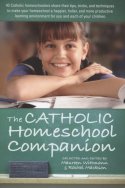 I'm having others review this book for love2learn and Heart and Mind, but I just finished the book and wanted to share some highlights.
I'm having others review this book for love2learn and Heart and Mind, but I just finished the book and wanted to share some highlights.The book is filled and overflowing with essays relevant to Catholic home educators. Here are a few titles to give you an idea - Grammar Phobia, Learning to Love Science, History as God's Plan, Art Appreciation: Recognizing Symbolism, Why Latin?, Learning Geography Through the Missions, Education In and Out of Doors, School is Where the Army Sends Us, Twenty-One Things Fathers Can Do for Their Homeschool, A Place of Function and Beauty: Getting Our Homes in Order, Toasted on One Side and Crusty on the Other? Five Fireproofing Secrets for Preventing Burnout and A Love of Learning.
I think my favorite section was "Homeschool Students and Graduates."
Mike Aquilina III, who, at age 13 had already published a book on St. Jude and run a computer consulting business, writes on "Unschooling at its Best," explaining how much the freedom of unschooling during the grade school years benefited him, even as he prepared to move into a more structured high school plan to prepare for college. Here's an interesting part of his story...
My first year as an unschooler was a success, at least to my parents and me ... However, others disagreed. In my home state of Pennsylvania, the laws about homeschooling are very strict. Among other rules and regulations, you must hand in a portfolio of work samples to be checked by your local school district every year. I handed in my book and radio license, among many other things, as samples in my portfolio, but the school district returned them, saying that I hadn't received an "appropriate education." The middle-school principal seemed quite shocked that there were no worksheets in the portfolio. My parents firmly disagreed, and eventually the principal backed down.
Colin Fry, a teen with spina bifida, shares his appreciation for homeschooling's flexibility because it helps them work around his medical appointments and his travels with his basketball team (in wheelchairs!). He shares...
Homeschooling has increased my love for my religion, my family, and my education. We're not just sitting around in our pajamas all day. We are working and growing as a family. Instead of being shut up in a classroom, we're able to get out into the real world for field trips, classes, and travel. I feel blessed to have been given this opportunity.
In "Homeschooled K Through 12", Clare Ruth Glomski, a college student and recent homeschool grad, reflects on her experiences and the transition to college.
I knew inside myself that I was capable of succeeding academically. Homeschooling is really a lot closer to university life than a public high school. There's a similar amount of self-direction and independent work. You decide if you're going to make it.
Brendan Hodge, a homeschool and college graduate, reflects on the goals of homeschoolers. Here is a particularly succinct piece...
What this comes around to is finding the objective of homeschooling. Obviously the immediate objective is to provide a solid academic and spiritual formation, superior to that which a traditional school could have provided. But beyond that, after the SATs, after the college applications, and even after the college graduations are over, what is it that parents and children seek to achieve together through homeschooling? In my book, the best end product is an independent, well-formed adult.
He even warns of the difficulties of "letting go"...
You can hold on. I've seen enough homeschoolers still in the nest during my time in college. Some of them are obedient in every detail, censoring their viewing, calling every night, asking whom they can date, and returning home for every vacation and sometimes permanently after graduation. Others go in the opposite direction and manage to dig up what drugs and alcohol are available.
Daniel Davis wasn't homeschooled, but was convinced of its efficacy while living with his homeschooled cousins during college. He has some particularly interesting things to say about homeschooling as a remedy for materialism:
...part of knowing where you come from is having a family there to teach you that you're above all a child of God. Homeschooling facilitates family bonding, growing out of constant togetherness. This translates into the source of happiness; knowing what is important, what is meaningful, and knowing the difference between need and greed.
Finally, in "A Love of Learning", Rosamund Hodge shares what her parents taught her...
My parents taught me that there is truth, real and objective and independent of our minds. They taught me that it's not only knowable, but worth knowing; that learning is honorable and valuable - and fun! They taught me that the past has wisdom and relevance for us today, and they taught me not to be afraid of those who mock learning.
Those lessons, more than any facts about empires or atoms, are the greatest legacy of my homeschooling. Every formal education comes to an end sooner or later; but the love of learning and the way of life my parents taught me will remain with me forever. And that's enough to make all the tribulations worthwhile.

No comments:
Post a Comment